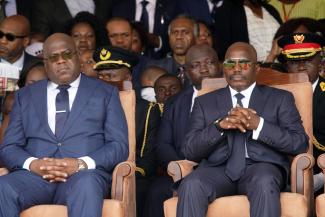DR Congo
Imperfect but historical elections

The shift of power from Joseph Kabila, who had run the country for 18 years, to Félix Tshisekedi was historical for the country and the region. The elections were relatively calm, and there was no major post-election unrest. It seems that the international community has opted to accept these imperfect but peaceful elections: regional powers such as South Africa and Kenya swiftly recognised Tshisekedi as the winner, and countries such as France, Belgium and the United States at least "took note" of his election.
Twenty-one candidates had been running for president (see my comment in D+C/E+Z e-Paper 2018/11, Debate section). However, three candidates took centre stage: Emmanuel Ramazani Shadary, handpicked by Kabila to represent the ruling party, and two opposition leaders. Tshisekedi represented the “Union pour la Démocratie et le Progès Social” (UDPS), a major opposition party led for more than three decades by his late father Etienne Tshisekedi, and Martin Fayulu, an influential businessman known for his integrity and consistency and founder of the political party “Engagement pour la Citoyenneté et la Démocratie” (ECiDé). It has been notable for its very strong political activism over the past decade.
The elections brought about large electoral coalitions of several political parties: on one side there was the “Front Commun pour le Congo” (FCC), the coalition of Kabila's ruling majority in power, which supported Shadary. On the opposing side there was LAMUKA, an alliance created by the main opposition leaders at a meeting in Geneva, Switzerland in November. This coalition appointed Fayulu as the opposition's common candidate. However, less than 24 hours after this appointment, Tshisekedi of UDPS and Vital Kamerhe of “Union pour la Nation Congolaise” (UNC) – a defector of Kabila’s party and former candidate for the 2011 presidential elections – broke the agreement and created a brand-new coalition, the “Camp pour le Changement” (CACH), which supported Tshisekedi’s candidacy.
The election campaign was relatively calm. A very committed population, however, acted increasingly demanding towards the candidates. While some candidates were able to gather huge crowds of supporters, others were prevented by the local people from holding meetings in certain parts of the country. One of them was Shadary. The former Minister of the Interior is hit by EU sanctions for human-rights violations because of his role in suppressing protests. The general feeling was that of a people fed up with 18 years of Kabila’s regime and with a strong desire for a radical change in Congolese politics.
Tshisekedi was declared winner by the electoral commission on 10 January with 38,6 % of the vote, ahead of Fayulu (34,8%) and Shadary (23,8%). These results came to everyone's surprise: several observers, including the Catholic Church, which had deployed about 40,000 observers, and a couple of foreign diplomats had announced Fayulu as the apparent winner. He immediately challenged the results and filed a complaint with the Constitutional Court, demanding a recount of the votes. According to his own count and that of the Catholic Church, Fayulu had won the presidential election with more than 61 % of the votes. However, the Constitutional Court confirmed Tshisekedi's victory on 19 January. The inauguration ceremony took place on 24 January.
Beyond the general feeling of hope inspired by this first peaceful transfer of power, many people question the legitimacy of the new leaders, given the imperfections that have marked the electoral process. On 26 December, four days before the vote, the electoral commission announced a postponement of the vote in the regions of Yumbi in the West and Beni and Butembo in the East, which include 1,256,177 voters or three percent of those registered. Yumbi has been the scene of community violence that left hundreds dead in December, while Beni and Butembo are affected by an Ebola epidemic as well as recurrent killings of civilians by local militias. In these regions, the vote is planned to take place on 31 March and to be limited to legislative and local elections, thus depriving the people of their right to vote for the president.
There were also rumours of a secret agreement between Tshisekedi’s CACH and Kabila’s FCC to preserve Kabila’s safety and political future against Fayulu, who is supported by two of Kabila’s main opponents: Jean-Pierre Bemba and Moïse Katumbi, who were both banned from running for president. Substantiating these rumours, Tshisekedi agreed on a coalition with the FCC in March. The FCC had won the majority of seats in parliament. Overall, the new president has a huge task ahead of him. He must deal with enormous challenges such as the fight against corruption, unemployment and high expectations of its people for change.
Jonathan Bashi works as a law professor and consultant in international development in the Democratic Republic of the Congo.
euz.editor@dandc.eu







